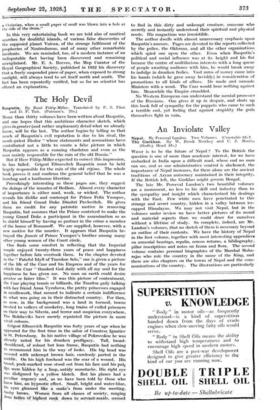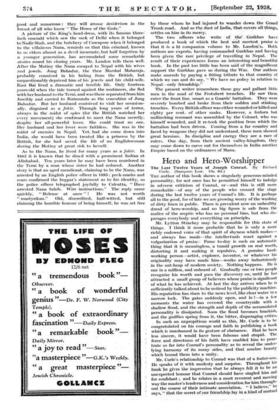An Inviolate Valley
WIIAT is to be the future of Nepal ? To the British the question is one of more than academic interest, for we have embarked in India upon a difficult road, whose end no man can see, and as our administrative control is slackened, the importance of Nepal increases, for there alone are the ancient traditions of Aryan autocracy maintained in their integrity. If the British left, the Gurkhas might govern Bengal.
The late Mr. Perceval Landon's two beautiful volumes are a monument, no less to his skill and industry than to the sympathy and insight which characterized his dealings with the East. Few white men have penetrated to this strange and secret country, hidden in a valley between ice- capped Himalayas. We may not visit Nepal, but in the volumes under review we have better pictures of its moral and material aspects than we could draw for ourselves without a lifetime of study. So complete, indeed, are Mr. Landon's volumes, that no sketch of them is necessary beyond an outline of their contents. We 'have the history of Nepal in the first volume, together with most interesting appendices on armorial bearings, regalia, census returns, a bibliography, pillar inscriptions and notes on fauna and flora. The second volume contains personal biographies of the Marshal Maha- rajas who rule the country in the name of the King, and there are also chapters on the towns of Nepal and the com- munications of the country. The illustrations are particularly good and numerous : they will arouse desiderium in the breast of all who know "The Home of the' Gods."
A picture-of the King's- head-dress, with Its famous tiiree-: inch emerald which saw the sack of Delhi when it belonged to Nadir Shah, and the butchery of Cawnpore when it belonged to the villainous Nana, -reminds us that this criminal, known to us elders almost as a devil incarnate, but half forgotten by a younger generation, has accumulated some remarkable stories round his closing years. Mr. Landon tells them well. After the Mutiny the Nana escaped to Nepal with his wives and jewels. Jung Itahadur, the then Marshal Maharaja, probably connived in his hiding from the British, but unquestionably deprived him of his jewels and his child-wife. Kasi Bai lived a dramatic and terrible life. Only fourteen years old when the tide turned against the mutineers, she fled with her husband to the Terai, and was there separated from him forcibly and carried to Katmundu as the concubine of Jung Bahadur. But her husband contrived to visit her occasion- ally, disguised as a fakir. Through long years of terror, always in the midst of spies (for the British watched her every movement) she continued to meet the Nana secretly, despite her all-powerful lover. She could trust no one. Her husband and her lover were faithless. She was in the midst of enemies in Nepal. Yet, had she come down into India, she would have been treated like a princess by the British, for she had saved the life of an Englishwoman during the Mutiny at great risk to herself.
As to the Nana, he lived for many years as a fakir. In 1885 it is known that he dined with a prominent Indian at Allahabad. Ten years later he may have been murdered in the Terai by a man whose sister he had seduced. Another story is that an aged mendicant, claiming to be the Nana, was arrested by an English police officer in 1895: pock-marks and scars confirmed the beggar's statement as to his identity, so the police officer telegraphed joyfully to Calcutta, "Have arrested Nana Sahib. Wire instructions." The reply came quickly, "Release at once " ! He was not worth "martyrdom." Old, discredited, half-witted, but still chinning the horrible honour of being himself, he was set free,
by those whom he had injured to wander down the Grand Trunk road. And so the dust of India, that:coirers all hings, settles on him in its mercy.
The two officers who write of the' -Gurkhas have produced a book of which the best and meetest praise is that it is a fit companion volume to Mr. Landon's. Both authors are experts, having commanded Gurkhas and having been given the rare privilege of travelling in Nepal. The result of their experiences forms an interesting and beautiful book. In the past too little has been said of the magnificent support the Gurkhas gave us during the War. Our authors make amends by paying a fitting tribute to that country of which we can and do say, "We have no policy in relation to Nepal—only friendship."
The present writer remembers those gay and gallant little men in the mud of the Festubert trenches. He saw them enter the front line, smart as a Guards' battalion. They were severely bombed and broke from their sodden and stinking trenches. Every British officer was either wounded or killed and eighty per cent, of other ranks. However, a forlorn but unflinching remnant was assembled by the Colonel, who was himself wounded, and it re-took the position from which the battalion had been driven. Coming from a far country and faced by weapons they did not understand, these men showed great heroism. In discipline and energy they are a race of rulers. One day, from their ancient valley-kingdom, they may come down to carve out for themselves in India another Empire based on the ordinances of Manu.







































 Previous page
Previous page